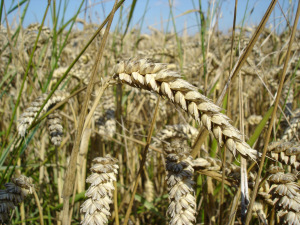Food For Thought #1: The Frankensteinification of Grains (Part 2)
Mutagenesis and the Frankenstein Grain
The Process of Mutagenesis has just as terrifying health implications as hybridization. Mutagenesis in grain is carried out by exposing wheat strains to mutagens in the form of hazardous gamma rays and x-ray radiation, and other chemical manipulation. Although, the implications of exposing the food we place in our body to hazardous chemicals and radiation is self-explanatory, it is important to note its potential hazards on livestock and the ecosystem as well. These essentially “mutant” wheat strains are also fed to livestock, which taints the animal food we consume as well. Addressing its effects on the ecosystem is a whole other battle in itself , but essentially you have these genetically superior crops of grain that can withstand disease and reproduce rapidly. This will impact plant diversity through monocultures, as well as induce even stronger plant based diseases to combat the now more resistant strands of grain.

Though wheat is not genetically modified, manipulation of wheat through procedures such as Mutagenesis and hybridization pose serious health implications.
‘Jonesing’ for Some Cornflakes
In addition to the autoimmune responses triggered by these manipulated strands of grain, there has been an established correlation between negating wheat from the diet, and pervasive withdrawal symptoms that accompany it. Once digested, wheat gluten protein breaks down into smaller molecules known as polypeptides. These gluten-formulated polypeptides are called exorphins, for their ability to mimic morphine-like activity in the brain. Exorphins travel through the bloodstream and have the capability of permeating the blood-brain barrier. Once in the brain the gluten based polypeptides have the ability of creating low-grade euphoria and satisfaction in the brain. Naloxone a synthetic drug that mimics the effects of morphine, is used to block opiate receptors in the nervous system to inhibit the affects of morphine. “Surprisingly”, this same drug is used to suppress appetite by blocking very similar euphoric pathways associated with foods such as wheat. In fact the pharmaceutical companies have capitalized on this opportunity by creating FDA approved drugs such as Contrave, which is a combination of Naltrexone and the antidepressant Bupropion. This drug was designed to suppress appetite, and the depressive state that is associated with the decreased appetites withdrawal symptoms.
Individuals who have weeded off of grain have experienced a multitude of withdrawal symptoms. Symptoms may include, low-energy, nausea, intense cravings, depression, dehydration, emotional outbursts, bloating, headaches, and an intensification of joint pain. Some argue that these ‘withdrawal’ symptoms result from the low blood sugar state associated with the immediate negation of grain-based foods. However, many of these symptoms are uncharacteristic of what one expects to see in an individual exhibiting hypoglycemia (low blood sugar).

The consumption of wheat mimics opiate like receptors similar to those activated by the use of morphine. This results in a low-grade euphoria that leads to a kind of wheat/grain addiction. When one stops consuming wheat, they will experience withdrawal symptoms associated with their decreased consumption.
The Fox in Sheep Clothing-Amylopectin A
In addition to its withdrawal effect, individuals who stop consuming wheat have seen a decrease if not a complete remission of previous health problems. Health complications such as hyperglycemia, onset diabetes, allergy, sinus issues, and gastrointestinal tract issues have all been documented as health complications that result from consuming wheat. According to Dr. William Davis, this may be linked to a complex carbohydrate unique to wheat known as Amylopectin A. Amylopectin A is highly digestible by the enzyme amylase found in saliva as well as by stomach secretions. Highly digestible carbohydrates such as Amylopectin A are the reason why complex carbohydrates are said to be better than simple carbohydrates such as sugar. Simple carbohydrates high rate of digestibility increases blood glucose levels and insulin sensitivity, and high insulin levels. This results in insulin resistance, and other complications such as type 2 diabetes and hyperglycemia. The Amylopectin-A carbohydrate found in wheat is evidenced to increasing blood sugar ounce for ounce higher than common table sugar (the most basic of simple carbohydrates).

The highly digestible nature of the complex carbohydrate Amylopectin A found in wheat bread, raises blood sugar ounce for ounce higher than the Common white table Sugar.
With a Grain of Salt
Though consuming wheat, a type of grain, has been linked to all these astonishing health defects and complications, it is necessary to note that it is mostly the manipulation of wheat in modern urban agriculture that has lead to these health complications. Even the consumption of the misleading complex carbs of wheat, and its misleading Amylopectin-A only prove detrimental if consumed abundantly and at specific intervals. As stated before, the thoughts and findings shared on the Food for Thought series, are merely to provoke thought and educate on potentially misleading truths throughout nutrition. It is up to you to continue this education and determine whether the supposed benefits of wheat outweigh its potential documented threats.
